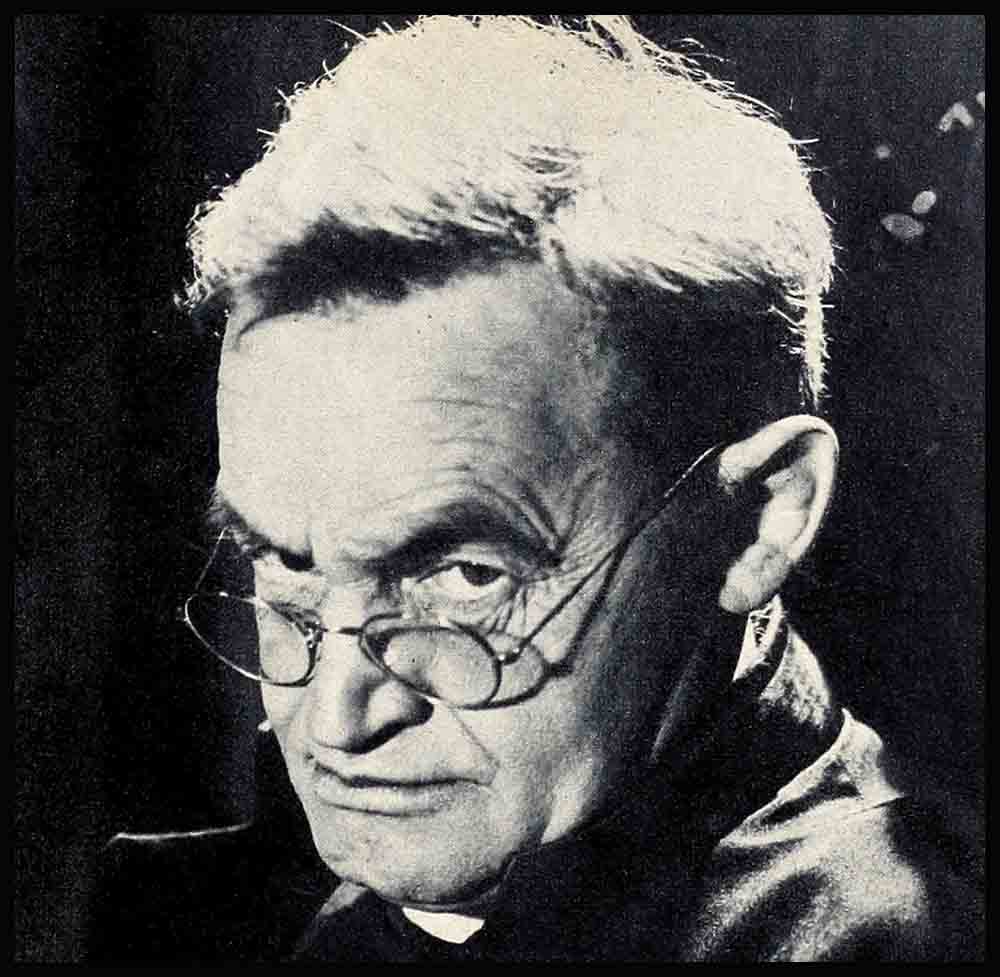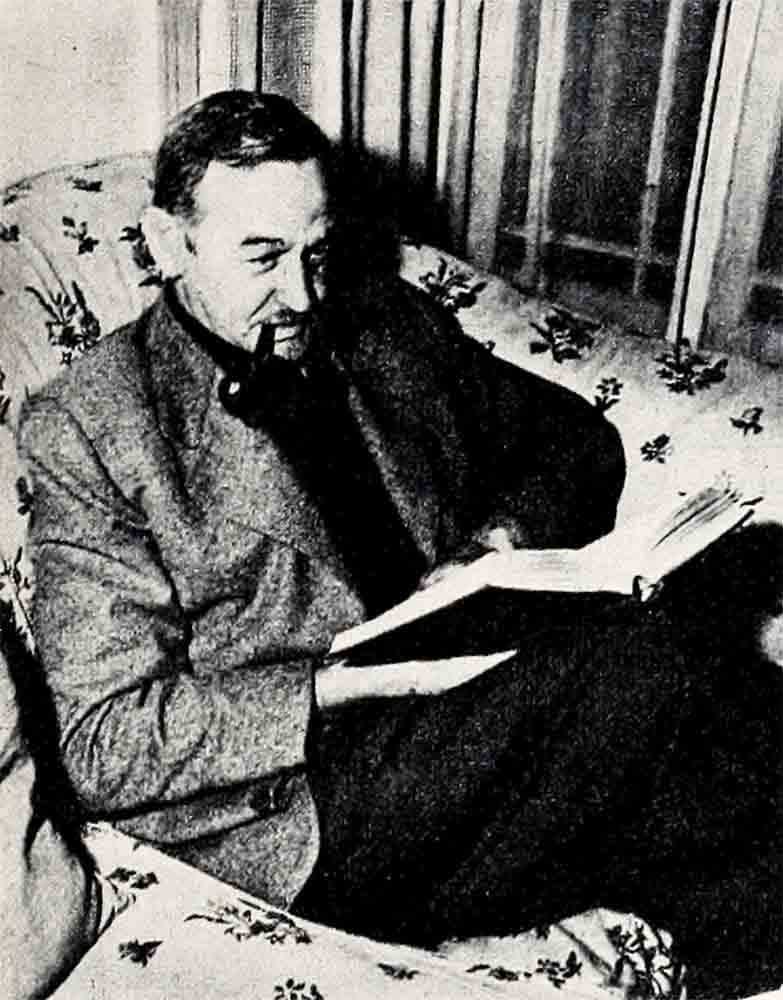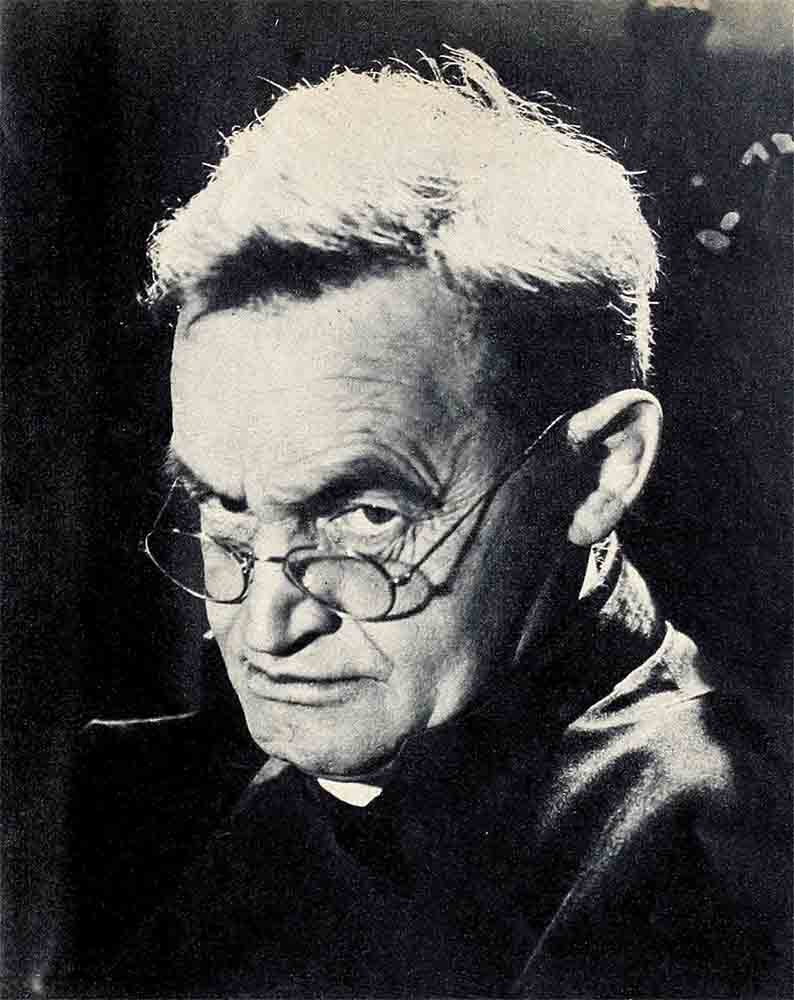
Barry Fitzgerald—The Shanghaied Irishman
Father Fitzgibbon of st. Dominic’s Church is one of the most larcenous old codgers in the country—he had the audacity to steal a picture right from under Bing Crosby’s nose!
The Father Fitzgibbon we’re talking about is Barry Fitzgerald, the Abbey Theatre veteran whose performance of the wonderful old priest in “Going My Way” is one of the shining delights of the screen year, an almost certain Academy Award winner, and whose characterization brightens the shadows of “None But The Lonely Heart.”
Barry remains completely unmoved by the shouts and the tumult. “Argh!” he says—and you have to use a brogue to pronounce that “Argh!”—“I’m no actor. I should never have given up me pension.”
And strange as it seems, he means it. Here’s a man who was a favorite in Dublin, London and New York long before Hollywood discovered him; who has now hit the jackpot with one of the richest roles of the year—and he regrets having given up an Irish civil service job which would have enabled him to retire, when he reached the age of sixty, on a pension of about $3250 a year.
The Irish of it, of course, is that money has nothing to do with his state of mind. No, what troubles Barry is his conviction—hold on to your seats, now!—that he isn’t much of an actor. Compliment him on a performance and he will look at you with the wary eye of an OPA inspector being offered a cigar by an applicant for a B-book. How—he asks—can a man be a good actor when he’s never taken a lesson in his life?
It’s no use reminding him that half the stars in Hollywood would give their false fronts and toupees to be able to say they were graduates of the Abbey Theatre, that fabled institution where the play’s always the thing and where a player may have the lead one week and be a butler the next. Barry’s not to be cajoled. So far as he is concerned, he was shanghaied onto the stage, became a comedian by accident and has been living another man’s life ever since!
It all goes back to a raw day in Dublin, thirty years ago, when a young clerk in the Board of Trade—William Joseph Shields by name—stepped into a bar and ordered a “dhrop of the craiture.” As he waited for his drink, he glanced around and recognized the man standing next to him as Fred Harford, an actor he had seen the night before at the Abbey. Now, in Dublin an actor is not regarded with the awe in which he commonly is held on this side of the Atlantic. His autograph is solicited only when he is signing a bar check and he never is asked for his favorite recipes, or whether he sleeps in pajamas, or what constitutes an ideal wife.
Consequently, Mr. Harford was gratified when the newcomer addressed him by name. He was delighted when Mr. Shields mentioned seeing his performance. He was overcome when the clerk paid him the extraordinary compliment of saying, “Ye weren’t too bad, ye know.” Nothing would do, after that, but for Mr. Shields to be his guest backstage for the performance that night. And Mr. Shields agreed. What the clerk hadn’t counted on—nor, in all probability, had Harford—was that the play called for a crowd scene: The bigger the better. So, with the rise of the curtain on Act Two, the bewildered little clerk was clapped into an old coat and hat and sent, with a dozen others, out onto the stage.
“I hadn’t the energy to refuse,” says Barry, “but I was shanghaied nonetheless. Ah well, Harford, poor soul, paid for it later. He ran afoul the law for something or other and he went to jail.”
Barry didn’t mind the experience. It was a novelty and he came back for more. They gave him a line, then more lines; and for the next fifteen years he was clerk Shields by day and actor Fitzgerald by night.
“I had a soft spot,” he says, “with a nice steady income. Evenings and Saturdays I went around to the theater when there was a spot for me. It was pleasant, ye know. Almost like a club. But it wasn’t anything a man could take seriously. Besides, I was looking forward to me pension.”
In 1929, he took the plunge and resigned his clerkship to lead the Abbey Players on three long tours of the United States and become one of the most beloved actors of our day and age and . . .
“Argh!” he says. “I should never have given up me pension. What good is money, anyhow, but to buy leisure? To work yourself to death getting money is to defeat its whole purpose.
“Beyond that, there’s nothing harder than a job which occupies half your mind all the time. I’ve often thought that the happiest men are those with the dullest jobs. Actors, painters, writers and the like ought to make their living swinging a pick or shovel. That way their money problems would be solved without the exercise of a brain cell and their minds would be free for Creative work. At my age, having to act for a living is a tiring—a very tiring—business.”
At his age, which is a wiry fifty-six, Barry rides a motorcycle, is a better-than-average swimmer, frequently plays thirty-six holes of golf in an afternoon, gets along on five hours sleep a night and will put on the gloves with any man his weight.
The Fitzgerald surface is small but corrugated—like a topographical map of Ireland. He’s a wee man, only five feet-three, with a shock of faded red hair, blue eyes and a leprechaun’s trick of looking whatever age suits his convenience.
A bachelor, he lives in a modest but comfortable rented house in the Hollywood hills. No swimming pool, no servants except a cleaning woman who comes in twice a week, and no one to fend for him but Gus Tallion, his stand-in. Gus is three-quarters Iroquois, a fact which at first disconcerted Barry, as he had read that the Iroquois were a blood-thirsty tribe “given to all forms and kinds of torture.” Gus proved harmless, however, and now is installed in one of the spare rooms. In exchange, he does the shopping and fixes breakfast.
“I suppose if I wanted to put on the dog for company I could ask him to wear a white jacket and he’d probably be good enough to do it,” Barry says. “But I’ll not be the one to torture an Iroquois. We’re friends as it stands.”
The notion of Barry putting on the dog for anyone is unthinkable. He never is seen in the fashionable night spots. Although he has been playing golf for thirty-five years, he has never joined a club. Half the people he knows and likes in Hollywood are the guys-named-Joe he has met playing the public courses.
Barry’s interest in the game, by the way, amounts almost to a fixation. When asked his opinion of Bing Crosby, meaning—of course—as an actor, he said, “He’s amazing. It’s a pleasure to watch him. His coordination is wonderful. What a swing What a stance! Argh! And me with me nineties after all these years!”
Fitzgerald will study a role for weeks—not attempting to learn lines, but character. It is only after he has mastered the spirit, the soul of the character he is to play that he starts on the dialogue.
Barry’s Father Fitzgibbon was a composite of two priests he knew in Dublin—good, simple men, not too bright, a bit set in their ways and fearful of innovations but as staunch as the crags of Killarney. Barry, although that rarity, a Dublin Protestant, went around with so many Catholics he tended to confuse their religion with his own and he still feels twinges of guilt if he eats meat on Fridays Yet he’s pleased as punch and chuckles inwardly when priests stop him on the street, as many have, and say, “It takes one of our own to show us as we really are.” He never sets them straight.
“It wouldn’t do,” he says, “to let them know I was born an Orangeman!” Right now, Father Fitzgibbon is map-shopping for a place that will remind him of Ireland.
“How about the coast of Maine?” he asked us. “I’ve heard it’s fine and foggy there and apt to be raw and cold so a man can enjoy pulling up to his fireplace and smoking his pipe.”
We told him Maine, at the proper season, was very much like that. Barry rubbed his hands together.
“I’ll have to look into it,” he said. “But, argh! I should never have given up me pension.”
We glanced along his mantelpiece. There were books in an unbroken row: The plays of O’Neill and O’Casey, of Shaw and Synge, Ibsen and Shakespeare. They and Barry Fitzgerald looked well together. We think he knows that, too.
THE END
It is a quote. PHOTOPLAY MAGAZINE JANUARY 1945






